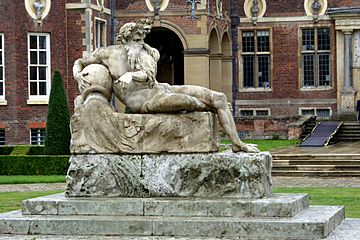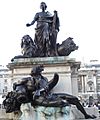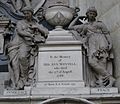John Bacon (sculptor, born 1740) facts for kids

John Bacon RA (born 1740 – died 1799) was a famous British sculptor. He lived and worked in the late 1700s. Many people consider Bacon to be the person who started the "British School of Sculpture." This means he helped create a unique style of sculpture in Britain.
King George III admired his work. You can find his sculptures in important places like St Paul's Cathedral and Westminster Abbey in London. His art also decorates Christ Church, Oxford, Pembroke College, Oxford, Bath Abbey, and Bristol Cathedral.
Contents
Biography
John Bacon was born in Southwark, London, on November 24, 1740. His father, Thomas Bacon, was a cloth worker.
When John was just 14, he started an apprenticeship at Mr. Crispe's porcelain factory in Lambeth. He began by painting small china decorations. Soon, he became a model maker. He used the money he earned to help his parents, who were having financial difficulties.
John saw models from famous sculptors being fired at a nearby pottery kiln. This inspired him to become a sculptor. He started copying these models very well. He even won a prize for a small figure of Peace that he sent to the Society for the Encouragement of the Arts. Between 1763 and 1776, he won their top awards nine times! During his apprenticeship, he also made better ways to create statues from stoneware.
Around 1763, Bacon started working with marble. He showed a medallion of King George III that year. He also created a new tool to help transfer designs from a model to marble more accurately. This tool was very precise and easy to use.
By 1769, Bacon was working for Eleanor Coade's "Artificial Stone Manufactory." In the same year, he won the first gold medal for sculpture from the Royal Academy. This was for a sculpture showing Aeneas and Anchises escaping from Troy.
In 1770, he showed a figure of Mars. He later made it in marble for Charles Pelham. This work earned him another gold medal and helped him become an associate of the Royal Academy. In 1771, Eleanor Coade made him the supervisor at her factory. He managed the model-making and design there until he died.
In 1774, a fan of his work, Mr. Johnson, gave him a new studio at 17 Newman Street. Bacon created a bust of King George III for Christ Church, Oxford. He remained a favorite of the King throughout his life. Some people criticized him for not knowing enough about classic Greek sculpture. He proved them wrong with a bust of Jupiter Tonans.
In 1795, he finished a statue of John Howard for St Paul's Cathedral. This was the first statue placed on the main floor of the cathedral in over a century. Bacon was considered the most successful public sculptor in England at the time. The church then asked him to create two more statues for the cathedral: one of Samuel Johnson in 1795 and another of Judge Sir William Jones in 1799.
John Bacon suddenly became ill on August 4, 1799, and passed away just a few days later, on August 7. He was buried in Whitefield's Tabernacle in London. He left behind a large family, including six sons and three daughters. His sons, Thomas Bacon and John Bacon Jr., continued his work.
Legacy
John Bacon is known as the founder of the British School of Sculpture. He won many awards and was highly respected by King George III. His sculptures are still admired today. You can see his works in famous places like St Paul's Cathedral and Westminster Abbey in London. They are also in Christ Church, Oxford, Pembroke College, Oxford, Bath Abbey, and Bristol Cathedral.
Selected Public Works
1770-1779
| Image | Title / subject | Location and coordinates |
Date | Type | Material | Dimensions | Designation | Notes |
|---|---|---|---|---|---|---|---|---|
 |
George Montagu-Dunk, 2nd Earl of Halifax | Westminster Abbey, London | 1771 | Bust with sculpture group | Marble | |||
 |
Aesculapius | Guy's Hospital, London | c. 1774 | Statue in niche | Stone | |||
 |
Old Father Thames | Forecourt of Ham House | 1775 | Statue on plinth and steps | Coade stone | |||
 |
William Pitt, 1st Earl of Chatham | Westminster Abbey, London | 1778 | Monumental sculpture group | Marble | |||
 |
Monument to Thomas Guy | Guy's Hospital Chapel, London | 1779 | Sculpture group on pedestal | Marble | |||
 |
George III with the River Thames | Somerset House, London | 1779 | Sculpture groups on pedestal | Bronze and stone |
1780-1789
| Image | Title / subject | Location and coordinates |
Date | Type | Material | Dimensions | Designation | Notes |
|---|---|---|---|---|---|---|---|---|
 |
Charles Roe | Christ Church, Macclesfield | 1781 | Low relief sculpture | Black & white marble | |||
 |
William Pitt, 1st Earl of Chatham | Guildhall, London | 1782 | Monumental sculpture group | Marble |
1790-1794
| Image | Title / subject | Location and coordinates |
Date | Type | Material | Dimensions | Designation | Notes |
|---|---|---|---|---|---|---|---|---|
 |
Memorial to Ann Whytell | Westminster Abbey, London | 1791 | Sculpture group | Marble | |||
 |
John Thomas, Bishop of Rochester | Westminster Abbey, London | 1793 | Bust | Marble | Also attributed to John Bacon, Junior | ||
 |
Memorial to Henry Hope | Westminster Abbey, London | 1793 | Deep relief sculpture | Marble |
1795-1799
| Image | Title / subject | Location and coordinates |
Date | Type | Material | Dimensions | Designation | Notes |
|---|---|---|---|---|---|---|---|---|
 |
John Howard | St Paul's Cathedral, London | 1795 | Statue on pedestal | Marble | |||
 |
Atlas and Hercules | Radcliffe Observatory, Oxford | 1795 | Sculpture group | Bronze | |||
 |
Dr Samuel Johnson | St Paul's Cathedral, London | 1796 | Statue on pedestal | Marble | |||
 |
Sir William Jones | St Paul's Cathedral, London | 1799 | Statue on pedestal | Marble |
Other Works
- Bust of Samuel Johnson, Pembroke College, Oxford
- Bust of George III in Christ Church, Oxford (1770)
- Seated statue of William Blackstone, the Codrington Library, All Souls, Oxford (1784)
- Pediment, Guy's Hospital, London (c. 1774)
- Monument to Mrs Draper, Bristol Cathedral (1780)
- Bust of Inigo Jones for the Carpenters Hall, London (1780)
- Monument to John Milton in St Giles Cripplegate, London (1793)
Images for kids
 | Emma Amos |
 | Edward Mitchell Bannister |
 | Larry D. Alexander |
 | Ernie Barnes |







